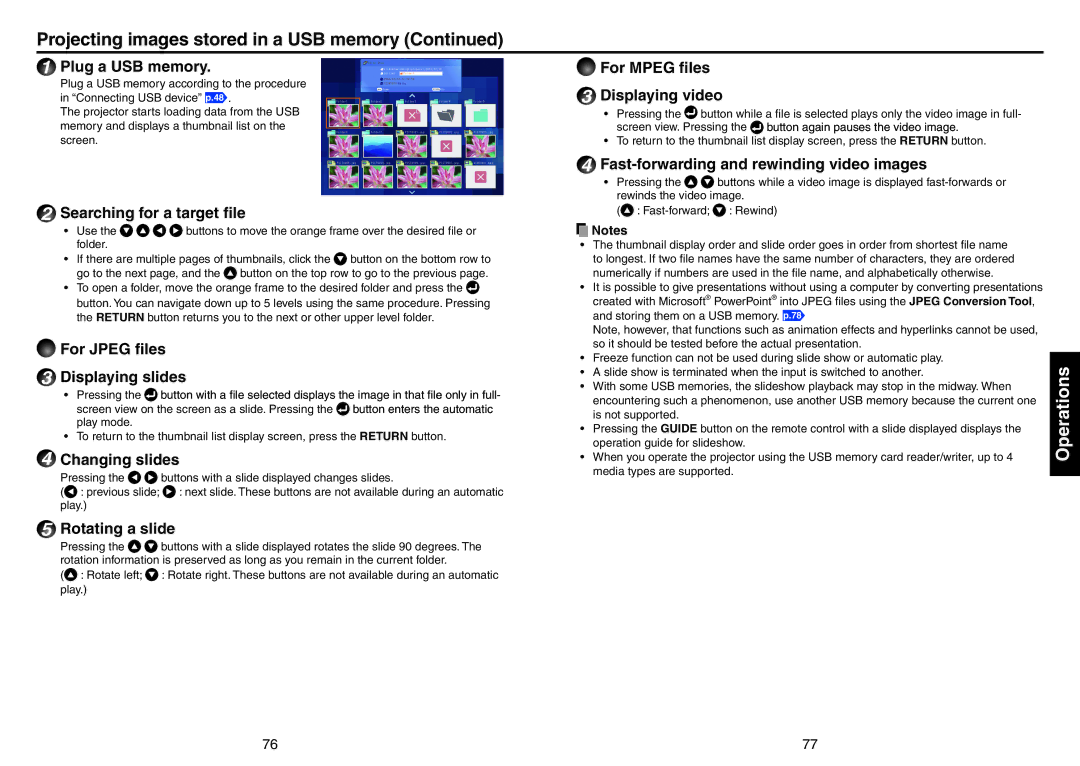
Projecting images stored in a USB memory (Continued)
1Plug a USB memory.
Plug a USB memory according to the procedure in “Connecting USB device” p.48 .
The projector starts loading data from the USB memory and displays a thumbnail list on the screen.
2Searching for a target file
•Use the ![]()
![]()
![]()
![]() buttons to move the orange frame over the desired file or folder.
buttons to move the orange frame over the desired file or folder.
•If there are multiple pages of thumbnails, click the ![]() button on the bottom row to
button on the bottom row to
go to the next page, and the ![]() button on the top row to go to the previous page.
button on the top row to go to the previous page.
•To open a folder, move the orange frame to the desired folder and press the ![]() button. You can navigate down up to 5 levels using the same procedure. Pressing the RETURN button returns you to the next or other upper level folder.
button. You can navigate down up to 5 levels using the same procedure. Pressing the RETURN button returns you to the next or other upper level folder.
 For JPEG files
For JPEG files
3Displaying slides
•Pressing the ![]() button with a file selected displays the image in that file only in full-
button with a file selected displays the image in that file only in full-
screen view on the screen as a slide. Pressing the ![]() button enters the automatic play mode.
button enters the automatic play mode.
•To return to the thumbnail list display screen, press the RETURN button.
4Changing slides
Pressing the ![]()
![]() buttons with a slide displayed changes slides.
buttons with a slide displayed changes slides.
(![]() : previous slide;
: previous slide; ![]() : next slide. These buttons are not available during an automatic play.)
: next slide. These buttons are not available during an automatic play.)
5Rotating a slide
Pressing the ![]()
![]() buttons with a slide displayed rotates the slide 90 degrees. The rotation information is preserved as long as you remain in the current folder.
buttons with a slide displayed rotates the slide 90 degrees. The rotation information is preserved as long as you remain in the current folder.
(![]() : Rotate left;
: Rotate left; ![]() : Rotate right. These buttons are not available during an automatic play.)
: Rotate right. These buttons are not available during an automatic play.)
 For MPEG files
For MPEG files
3Displaying video
•Pressing the ![]() button while a file is selected plays only the video image in full-
button while a file is selected plays only the video image in full-
screen view. Pressing the ![]() button again pauses the video image.
button again pauses the video image.
•To return to the thumbnail list display screen, press the RETURN button.
4Fast-forwarding and rewinding video images
•Pressing the ![]()
![]() buttons while a video image is displayed
buttons while a video image is displayed
(![]() :
: ![]() : Rewind)
: Rewind)
![]() Notes
Notes
•The thumbnail display order and slide order goes in order from shortest file name to longest. If two file names have the same number of characters, they are ordered numerically if numbers are used in the file name, and alphabetically otherwise.
•It is possible to give presentations without using a computer by converting presentations created with Microsoft® PowerPoint® into JPEG files using the JPEG Conversion Tool, and storing them on a USB memory. p.78
Note, however, that functions such as animation effects and hyperlinks cannot be used, so it should be tested before the actual presentation.
•Freeze function can not be used during slide show or automatic play.
•A slide show is terminated when the input is switched to another.
•With some USB memories, the slideshow playback may stop in the midway. When encountering such a phenomenon, use another USB memory because the current one is not supported.
•Pressing the GUIDE button on the remote control with a slide displayed displays the operation guide for slideshow.
•When you operate the projector using the USB memory card reader/writer, up to 4 media types are supported.
Operations
76 | 77 |
